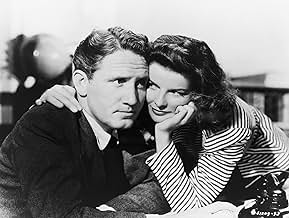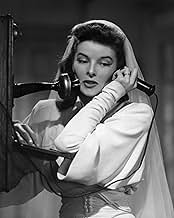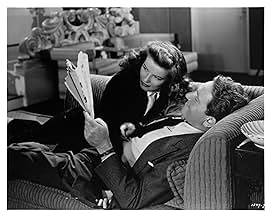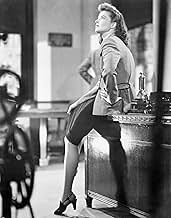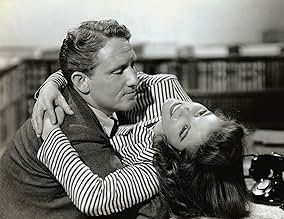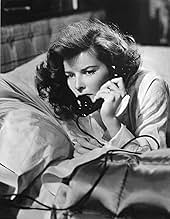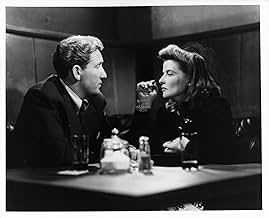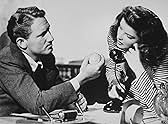Füge eine Handlung in deiner Sprache hinzuSportswriter Sam Craig and columnist Tess Harding, with the same New York newspaper, overcome their initial antagonism, fall in love and get married, only to find their relationship strained... Alles lesenSportswriter Sam Craig and columnist Tess Harding, with the same New York newspaper, overcome their initial antagonism, fall in love and get married, only to find their relationship strained when he comes to resent her hectic lifestyle.Sportswriter Sam Craig and columnist Tess Harding, with the same New York newspaper, overcome their initial antagonism, fall in love and get married, only to find their relationship strained when he comes to resent her hectic lifestyle.
- Regie
- Drehbuch
- Hauptbesetzung
- 1 Oscar gewonnen
- 5 Gewinne & 2 Nominierungen insgesamt
- Dr. Lubbeck
- (as Ludwig Stossel)
- Cab Driver
- (Nicht genannt)
- Stage Doorman
- (Nicht genannt)
- Phone Girl
- (Nicht genannt)
- Baseball Fan
- (Nicht genannt)
Empfohlene Bewertungen
The scenario is simple; Beautiful, brilliant Claire Booth Luce-type journalist(Hepburn) and practical, salt-of-the-earth sportswriter (Tracy) clash over whether athletic events should be suspended for the duration of the war (she finds them too frivolous in such serious times, he believes them essential for morale). After she makes some insensitive comments on the radio, he criticizes her in his sports column. Despite the paper-selling feud that results, their editor brings them together to make peace...and the pair, seeing one another in person for the first time, fall in love! Despite their busy schedules, he takes her to a ball game (which she loves) and she introduces him to her international friends (which he doesn't). Nonetheless, they marry, but he quickly discovers she is so busy 'saving the world' that she can't make time for him...and then she 'adopts' a war orphan, without consulting him, or considering how little time for 'motherhood' she's willing to give. He realizes a drastic step must be taken, as she is clueless about what being a 'wife' and 'mother' means...
While the domesticity scene concluding the film seems out of place (the story goes that MGM added it to make Tracy the 'winner' of the 'battle of the sexes', to a much more chauvinistic 40s audience), so many scenes ring true that the film goes beyond simple comedy/drama to a timeless statement about commitment, priorities, and accountability for one's actions. And despite the serious issues raised, it makes you laugh, too! Hepburn's reactions at the ball game, and Tracy, trying to be inconspicuous at the women's club meeting, are among the comic highlights. The star duo are so natural together that it's hard to believe this was their first teaming, and the chemistry carried over into their private lives as well, beginning a romance that lasted 25 years.
WOMAN OF THE YEAR is, deservedly, a classic!
I think that's what the authors of the screenplay Michael Kanin and Ring Lardner, Jr., had in mind in the script as well. As mismatched a pair if there ever were, he a down to earth sports columnist and she a world famous news reporter and commentator, fall in love.
As her celebrity is much wider known than his, Hepburn expects to have it all her own way. The rest of the film is concerned with their efforts to adjust to each other.
Katharine Hepburn's character is based on liberal radio commentator and reporter Dorothy Thompson. Not surprising that no one has mentioned that yet in all the reviews so far. The giveaway is Tracy first hearing her voice on the radio while in his favorite sports bar on Information Please where Thompson was a guest. Her career petered out after World War II, so she's not known to today's audience.
Writers Kanin and Lardner had as a model for the Tracy character Lardner's own father. Ring Lardner was one the celebrated sports writers of the first half of the 20th century, a great reporter and humorist. While Tracy is not as witty as Ring Lardner, he is definitely as down to earth.
My favorite scene is Spencer Tracy trying to feel comfortable at an international gathering at her place, looking even for people who speak English. Of course she's equally as uncomfortable at William Bendix's bar where Tracy likes to hang out.
Hepburn, comfortable in her celebrity, just sails through life, getting awards here and there. When she thinks of a Greek orphan kid she gets pressured into taking in as another award, that's when Tracy puts his foot down.
Based on some real celebrities, Tracy and Hepburn become those celebrities in the flesh. It's an awesome debut for what turned out to be a great screen team.
Look for fine performances by William Bendix, Fay Bainter, Minor Watson and Dan Tobin. Kanin and Lardner copped the film's only Oscar for an original screenplay. Hepburn was nominated for Best Actress, but lost to Greer Garson in Mrs. Miniver.
If Woman of the Year were remade today, the producers might consider making the woman the sports reporter. Seeing Jeannie Zelasko covering the World Series this year, I'm sure it would work very well.
The point of the script is actually relatively modest. It is not, in fact it is far from, The Taming of the Shrew, or the subjugation of the independent woman. Tracy's character admires Hepburn's character's independence and competence, and he doesn't want her to renounce them to become the "little woman" -- that is the burden of his "kitchen speech" at the end. He simply understands better than she does, at least until the end of the film, that maintaining a relationship and a marriage requires time, work, and attention. That may well be an unwelcome message, but it is not an unwise one.
The comedy of the film comes from their characters' different worlds -- Tracy is a sportswriter and Hepburn an international politics columnist. The drama comes from their different levels of commitment to being a couple. The script delicately and for the most part successfully (with the possible exception of the Greek orphan subplot), balances these two conflicts and the comedy and drama.
However, rather than the comic fireworks generated by their later collaboration, 1949's "Adam's Rib", this film treads in unexpectedly sentimental melodrama, especially in the episodes where Tess has to let go of a Greek orphan she wants to adopt and in the climactic scene when she tearfully recognizes her wifely responsibilities as her aunt Ellen marries her father. Still, the pair's familiar bantering occurs when Sam explains the rules of baseball to Tess and in the final feminist reversal as she fails miserably in her attempt at domesticity. George Stevens directed the film, and he displays his sure hand with actors and an acute sense of craftsmanship throughout. Intriguingly, for a Tracy-Hepburn vehicle, it feels much more like her movie than his, and consequently their rapport is not quite up to their normal standard here. The supporting characters also feel more incidental here, even though Fay Bainter shines briefly as Ellen. It's not my favorite of their films together, but it is certainly required viewing for their fans. There are no extras with the 2000 DVD.
Tess and Sam meet when they have a war of words in their articles over baseball, and when the editor tells them to make up, that is when they begin seeing each other. Now Tess doesn't hide how busy she is, or how full her apartment often is of people from all over the world that she knows, yet Sam marries her and I get the feeling that he is disappointed that nothing changes. Their wedding being practically a drive through affair should have given him a hint.
So naturally the marriage eventually fails when Sam walks out. That is Tess' first surprise. Her second surprise is when the woman she has patterned herself after for years and years, Ellen Whitcomb (Fay Bainter), makes a totally unexpected, but not unwelcome, move. How does this all work out? Watch and find out.
I'm not sure this film is ultimately sexist or feminist. It does look like the script was trying to paint Hepburn's character as an ice queen, and she just acted her way out of being portrayed in that fashion. She ultimately plays it as a person who, if she takes up a task, goes all the way with it, right down to the humorous scene where she tries to make breakfast and acts like every utensil in the kitchen is from another planet, yet she persists in the face of hilarious adversity and inexperience. However, if you turn the roles of Sam and Tess around, you could say this was a feminist film, maybe giving men a dose of their own 1942 medicine when they expected women to just live with whatever work schedule the man had, even if they sat home alone at nights.
I'd highly recommend this as one of the great romantic films, and they didn't make many of those during WWII outside of Casablanca.
Wusstest du schon
- WissenswertesKatharine Hepburn refused to reveal who wrote the screen play to Louis B. Mayer until after he bought the project from Hepburn. Hepburn was afraid that Mayer would low-ball the two authors (Michael Kanin and Ring Lardner Jr.) because, at the time, they were both relatively unknown.
- PatzerIn the kitchen, Tess uses a vacuum coffee maker (Cona). However, if she had put the coffee in the bottom of the coffee maker and the water in the top, as shown, it wouldn't have made coffee at all.
- Zitate
Tess Harding: [In the stands at the ballpark, observing the large crowd in attendance] Are all these people unemployed?
Sam Craig: No, they're all attending their grandmother's funeral.
- Alternative VersionenThere is an Italian edition of this film on DVD, distributed by DNA Srl: "LA DONNA DEL GIORNO (1942) + INCANTESIMO (1938)" (2 Films on a single DVD, with "Woman of the Year" in double version 1.33:1 and 1.78:1), re-edited with the contribution of film historian Riccardo Cusin. This version is also available for streaming on some platforms.
- VerbindungenFeatured in George Stevens (1984)
- SoundtracksBridal Chorus (Here Comes the Bride)
(1850) (uncredited)
from "Lohengrin"
Written by Richard Wagner
Played on an organ at the wedding
Top-Auswahl
- How long is Woman of the Year?Powered by Alexa
Details
- Erscheinungsdatum
- Herkunftsland
- Sprachen
- Auch bekannt als
- La mujer del año
- Drehorte
- Produktionsfirma
- Weitere beteiligte Unternehmen bei IMDbPro anzeigen
- Laufzeit
- 1 Std. 54 Min.(114 min)
- Farbe
- Seitenverhältnis
- 1.37 : 1



